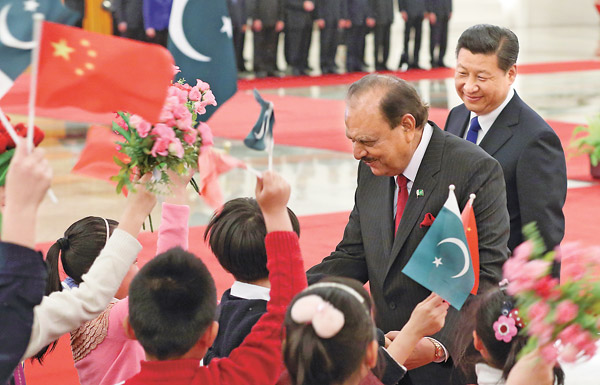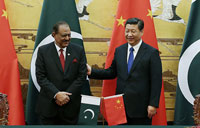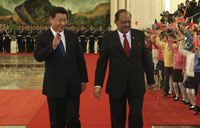 |
|
President Xi Jinping accompanies his Pakistani counterpart Mamnoon Hussain at a welcoming ceremony in Beijing on Wednesday. Xu Jingxing / China Daily |
Leaders call for work to be sped up on multibillion dollar project with Pakistan
China and Pakistan signed agreements for energy and infrastructure projects on Wednesday as they vowed to soon give "practical shape" to a trade and transport corridor linking the neighbors.The documents were signed after a meeting between President Xi Jinping and visiting Pakistani President Mamnoon Hussain, who is on his first official overseas visit since assuming office in September.
|
 |
| China-Pakistan nuclear co-op 'peaceful' |
|
 |
| Pakistan, China to step up energy, trade projects |
Among the papers signed are memorandums of understanding on construction on the new Gwadar international airport, upgrading part of the Karakorum highway linking the nations and establishing a joint research center for hydropower technology.
The Wall Street Journal assessed the value of the agreements at $20 billion. Without confirming the figure, Luo Zhaohui, director of the Department of Asian Affairs at the Foreign Ministry, told China Daily the final amount depends on the implementation.
China shares a 600-kilometer border with Pakistan. The multibillion dollar economic corridor project connecting Kashgar in China’s Xinjiang Uygur autonomous region to the port of Gwadar in Southwest Pakistan was proposed during Premier Li Keqiang’s visit to Islamabad in May.
"The leaders of China and Pakistan urged relevant offices on both sides to speed up work on the economic corridor," said a joint statement issued after the presidents met.
It says they should work to ensure the corridor "starts to take practical shape soon and yields tangible benefits".
"Friendship with China is the most important pillar of our foreign policy and security policy," Hussain told Xi, adding that all political parties in his country support the unique friendship with China.
"China will, as always, view its relations with Pakistan from a strategic height and a long-term angle, and make the relationship a priority of neighborhood diplomacy," Xi said.
Luo Zhaohui said the nations also reached consensus on developing Pakistan’s energy industry, which he described as the country’s "bottleneck".
In the joint statement, China assured Pakistan of "its full support" in helping the latter address its energy deficit.
China will continue to support investments by its companies in Pakistan’s conventional and renewable energy sectors, the paper said.
Mushahid Hussain, chairman of the Pakistan-China Institute and chairman of the Pakistan Senate Defense Committee, told China Daily the economic corridor is the core agenda of the visit, noting it is also part of the Silk Road Economic Belt proposed by Xi in Kazakhstan last year.
"Regional cooperation, driven by economy and energy, is the foundation on which the two countries are moving forward together in the 21st century," he said.
Chen Jidong, director of the Pakistan Study Center at Sichuan University, said the corridor will also benefit Central Asian countries including Iran and Afghanistan.
The leaders also recognized counterterrorism as another key area of cooperation.
"Pakistan recognized the ETIM (East Turkistan Islamic Movement) as a terrorist organization, which poses a common threat to the peace and stability of China and Pakistan," the Wednesday joint statement said.
Fu Xiaoqiang, director of the Center for Counterterrorism Studies under the China Institutes of Contemporary International Relations, has told China Daily that the ETIM — which has plotted many murders in Xinjiang — has been funded by al-Qaida and its members are active in tribal areas of Pakistan and Afghanistan.
China and Pakistan also vowed to beef up cooperation on defense technology and to accelerate negotiations on a free trade area.
Xi told Mamnoon Hussain that Beijing appreciates Islamabad’s efforts to soothe its relations with New Delhi. Mamnoon Hussain said Pakistan will continue communicating with India and improve ties.
The Pakistani president started a three-day state visit to China on Tuesday. He met top legislator Zhang Dejiang earlier on Wednesday and is scheduled to meet Premier Li soon. He will then travel to Shanghai.
Contact the writers at [email protected] and [email protected]
Pu Zhendong contributed to this story.
